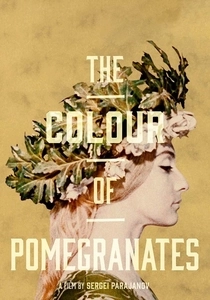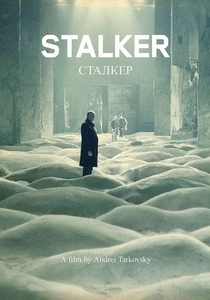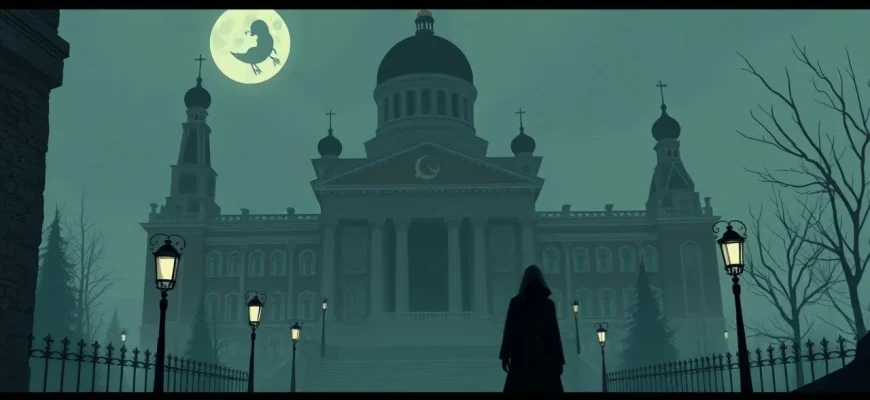Soviet cinema, often associated with propaganda and social realism, also ventured into the realm of horror, creating films that are both unique and unsettling. This collection of Soviet horror films offers a rare glimpse into the darker side of Soviet storytelling, where the supernatural meets the political, and the eerie atmosphere is as much a character as the actors themselves. These films, now available with English dubbing, provide an intriguing look at how horror was interpreted and portrayed behind the Iron Curtain.

The Color of Pomegranates (1969)
Description: This visually stunning film by Sergei Parajanov, while not a horror in the conventional sense, has a haunting, almost surreal quality that can be unsettling. It's a poetic exploration of the life of Armenian poet Sayat-Nova, filled with symbolic imagery.
Fact: Parajanov faced significant censorship and was imprisoned for his work, which was seen as too avant-garde by Soviet authorities.
 Watch Now
Watch Now 
Stalker (1979)
Description: Another Tarkovsky film, "Stalker" explores themes of desire, despair, and the supernatural. The journey into the Zone, a mysterious area where wishes can come true, is fraught with psychological horror and existential dread.
Fact: The film was shot in Estonia, and the Zone was created using real abandoned industrial sites, adding to its eerie authenticity.
 Watch Now
Watch Now 
Viy (1967)
Description: This film, based on a Nikolai Gogol story, is often considered the first Soviet horror movie. It tells the tale of a seminarian who must spend three nights in a church to exorcise the spirit of a witch, leading to some of the most memorable and terrifying scenes in Soviet cinema.
Fact: The film was initially banned by Soviet censors for its supernatural content but was later released due to public demand. It was also one of the first Soviet films to be shown in the West.
 30 Days Free
30 Days Free 
The Ascent (1977)
Description: While primarily a war drama, "The Ascent" has elements of psychological horror as it portrays the brutal realities of WWII, focusing on the moral and physical descent of two partisans.
Fact: Directed by Larisa Shepitko, the film won the Golden Bear at the Berlin International Film Festival, showcasing its powerful storytelling.
 30 Days Free
30 Days Free 
The Dead Mountaineer's Hotel (1979)
Description: This film, based on the Strugatsky brothers' novel, combines elements of sci-fi, mystery, and horror. It's set in a remote hotel where a detective must solve a series of bizarre and deadly events, creating an atmosphere of suspense and dread.
Fact: The film was directed by Grigori Kromanov, who was known for his work in both Soviet and Estonian cinema. It was one of the few Soviet films to explore themes of existential horror.
 30 Days Free
30 Days Free 
The Irony of Fate (1975)
Description: While not a traditional horror film, this comedy-drama has elements of psychological horror due to its premise of mistaken identity leading to a surreal and unsettling situation. It's included for its unique approach to horror through comedy.
Fact: The film was a massive hit in the USSR and is traditionally watched on New Year's Eve. Its English dubbing makes it accessible to a broader audience.
 30 Days Free
30 Days Free 
The Mirror (1975)
Description: Andrei Tarkovsky's masterpiece, while not strictly a horror film, delves into psychological horror through its exploration of memory, time, and identity, creating a dreamlike, sometimes nightmarish atmosphere.
Fact: Tarkovsky was known for his slow, contemplative style, which often left audiences with a sense of unease and introspection.
 30 Days Free
30 Days Free 
The Return (2003)
Description: This film, while post-Soviet, captures the essence of Soviet-era horror with its story of a father returning to his sons after a long absence, leading to a journey filled with tension, mystery, and psychological horror.
Fact: Directed by Andrey Zvyagintsev, the film won the Golden Lion at the Venice Film Festival, highlighting its international appeal.
 30 Days Free
30 Days Free 
The Witch (1957)
Description: A lesser-known film, "The Witch" deals with themes of superstition and fear in a small village, where a woman is accused of witchcraft, leading to a chilling exploration of mob mentality and fear.
Fact: The film was one of the few Soviet productions to openly address the topic of witchcraft, which was a sensitive subject under Soviet rule.
 30 Days Free
30 Days Free 
The House on the Embankment (1976)
Description: This film, based on Yuri Trifonov's novel, delves into the lives of residents in a prestigious Moscow apartment building, revealing the dark secrets and horrors of Soviet life under Stalin.
Fact: The film was part of the "Thaw" period in Soviet cinema, where more critical views of Soviet history were allowed.
 30 Days Free
30 Days Free 








